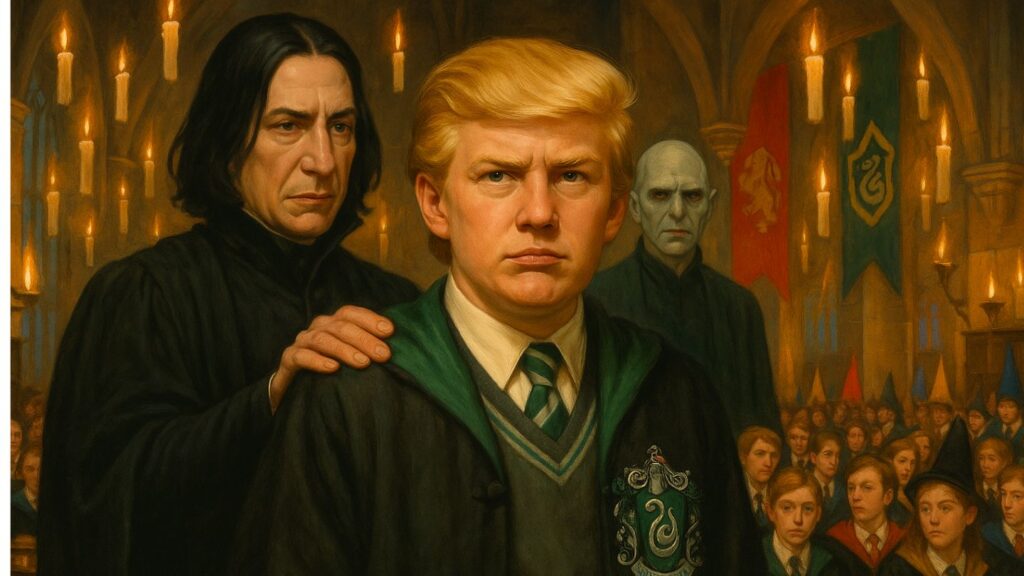 The image hit my inbox early this morning, and I couldn’t look away. There he was, cloaked in Slytherin green, standing with that unmistakable scowl—a young Donald Trump flanked by Severus Snape and the Dark Lord himself. Hogwarts’ Great Hall stretched out behind them, candlelit and shadowed, the emblems of rival houses looming like sentinels.
The image hit my inbox early this morning, and I couldn’t look away. There he was, cloaked in Slytherin green, standing with that unmistakable scowl—a young Donald Trump flanked by Severus Snape and the Dark Lord himself. Hogwarts’ Great Hall stretched out behind them, candlelit and shadowed, the emblems of rival houses looming like sentinels.
For a moment, I just stared. Was this some kind of political satire? A fan artist’s fever dream? Maybe, but the longer I looked, the more it made sense.
There’s always been this unspoken understanding among Harry Potter fans that Slytherin represents more than just “evil.” It’s ambition, cunning, and the relentless pursuit of power—traits that are neither inherently good nor bad, but that hinge heavily on the wielder’s intent. I imagine the Sorting Hat would have had very little trouble with this decision. In fact, I think it might have barely brushed his head before shouting “Slytherin!” to the rafters.
It’s easy to demonize Slytherin House, to pin every act of malice and dark magic on its serpentine crest. But ambition in itself isn’t the villain. It’s what you do with that ambition that defines you. Think of Snape: someone who danced on the razor’s edge of darkness but still managed, in the end, to wield that ambition for something more profound than himself. Sacrifice. Protection. Even redemption.
But then, the figure in this portrait isn’t Snape. He’s something far more familiar—a figure driven by ambition, yes, but also by the trappings of ego, the obsession with dominance, and the refusal to accept any view but his own. It’s Voldemort’s shadow that looms over his shoulder, not Dumbledore’s.
The artist’s choice to place Trump in Slytherin robes isn’t just satire—it’s a statement on the nature of ambition untethered from humility or empathy. It’s Slytherin at its most dangerous: a drive for power for its own sake, without regard for the damage left in its wake.
I can almost imagine him at Hogwarts, sneering from the Slytherin table, hatching schemes not to master magic but to control it, to bend it to his will. For someone like him, the Room of Requirement wouldn’t be a place of need—it would be a vault for secrets, a hoard of power waiting to be leveraged.
If Hogwarts teaches anything, it’s that true strength doesn’t come from domination—it comes from unity, from the willingness to fight for something greater than yourself. The artist captured that contradiction perfectly: ambition without purpose, power without conscience, and loyalty that is always conditional.
And isn’t that the lesson Rowling wrote for us, hidden between enchanted pages and midnight book releases? That our choices—not our houses—define us. And some choices are darker than any magic could conjure.

